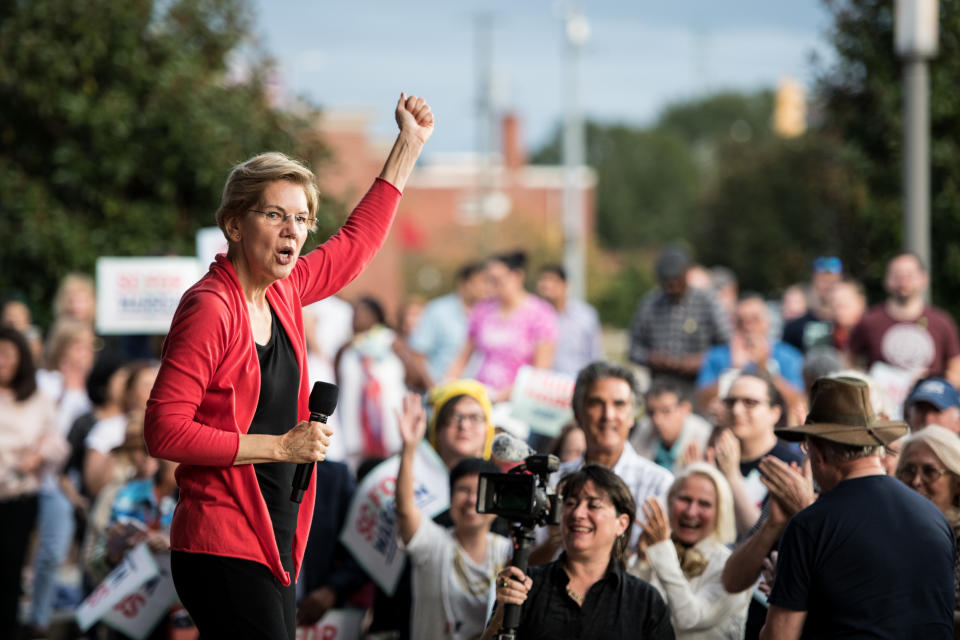How the Fed might adjust for the 'chaos' of a Warren presidency, and boost stocks
Could an Elizabeth Warren presidency be beneficial for the market after all? In a roundabout way, one analyst thinks it might.
Conventional Wall Street wisdom suggests that a presidential victory by the Massachusetts senator and Democratic presidential contender — who has embraced a wealth tax along with universal health care and other federal budget-busting policies — would be an unequivocal negative for stocks, particularly an S&P 500 (^GSPC) that set a new record on Monday.
But an analysis by David Zervos, chief market strategist at Jefferies suggests that a Warren presidency’s big-ticket agenda may create a domino effect that, under the right set of circumstances, would lead to massive monetary stimulus by the Federal Reserve — and send stocks to new records.
In recent days, Warren — a scourge of the wealthy investor class — has cemented her status as frontrunner. Former Vice President Joe Biden has been losing altitude in polls and fundraising, while President Donald Trump’s political woes are growing more acute.
“The typical Warren deliberation with clients begins with the idea that a surprise win would probably create a 15-25% downdraft in [the S&P 500 Index],” Zervos wrote in a research note Monday.
He argued the broader market appears to be pricing in the likelihood of a Warren victory: should Warren prevail, an S&P at 2,400 appears to be “a feasible midpoint after a surprise win,” Zervos wrote — with a risk of hitting 15-20% lower, depending on whether Democrats win the Senate and hold the House. On Monday, the index spiked to a new high above 3,044.
Fed to adjust for ‘Warren induced chaos’
A recent RBC Capital Markets survey shows that a Trump victory is viewed by most investors (61%) as good for stocks. While two-thirds of respondents expect Trump to get re-elected in 2020, that number has dwindled. Meanwhile, a growing number think Warren will lead the Democratic ticket.

Warren’s brand of left-wing populism, including her antipathy toward Wall Street, has created angst among Wall Street and pro-market Democrats. As a candidate, Warren has embraced expensive proposals like student debt forgiveness and clean energy that are likely to cost trillions.
It’s created expectations that certain sectors of the market, including health care, financials, technology and energy — all areas where Warren has adopted a hard-line policy stance — would likely take a hit, Zervos estimated.
“But lately I have been thinking a lot less about what her policies will do to real returns and more about what the Fed would do to risk-free real rates,” the analyst said, arguing that the central bank’s “underbelly... aka the staff lifers, the long-standing presidents, and the governors from the prior administration — are going to be thrilled with a Warren win.”
As president, Warren would also be able to name the next Fed chief, as well as appoint several new Fed Open Market Committee members whose tenures are set to expire after the November 2020 elections. In theory, it could give her free rein to appoint like-minded policymakers, and would mark an end to the acrimonious relations between the White House and the Fed that characterized the Trump presidency.
If the policy inclinations of Fed bureaucrats are taken into account, the U.S. economy would return to zero interest rate policy and massive quantitative easing (QE) “before you can blink,” according to Zervos. The central bank could also retool its inflation targeting framework, helping them to manage “any Warren-induced financial market chaos.”
However, “the real key here is that even though expected real returns on capital, corporate earnings, and economic growth get marked down with Warren’s policy initiatives, risk-free real rates go down even more,” Zervos said. “And for investors, it’s the spread that matters.”
A notable test case would be former President Barack Obama’s administration, during which the S&P 500 skyrocketed from post-2008 crisis lows.
“One could argue that Warren and Obama have pretty similar political tendencies – at least when it comes to financial regulation, environmental regulation, progressive taxation, and health care,” Zervos wrote. “And to be sure, many people in the markets were not too excited about expected real returns on capital after Obama took office in early 2009.”
Yet massive bond buying and zero interest rates ignited a bullish trend for stocks. “With the underlying structure of the Fed, a Warren win would likely quickly set off one of the most dovish backstopping pivots in the history of the institution,” according to Zervos.
Meanwhile, the surge in inflation expectations would be “very welcome news for risky assets. Maybe the markets already see this, and that’s why Warren’s recent increase in the polls is not affecting” the S&P 500, he added.
—Yahoo Finance’s Sibile Marcellus contributed to this article.
Javier David is an editor for Yahoo Finance. Follow Javier on Twitter: @TeflonGeek
Read more:
UBS: Wealthy investors optimistic, but nervous about politics and trade
Amazon's stock swoons after Q3 earnings miss, even as revenue beats
CME dismisses Vanity Fair Trump chaos trade story as ‘patently false’
Why Saudi Aramco’s ‘aspirational’ $2 trillion listing is leaving investors cold
Trump tweets and market volatility have a 'statistically significant' relationship, BofA finds
Trump rips Fed's Powell, demands companies seek 'alternatives' to China
Read the latest financial and business news from Yahoo Finance
Follow Yahoo Finance on Twitter, Facebook, Instagram, Flipboard, SmartNews, LinkedIn, YouTube, and reddit.
